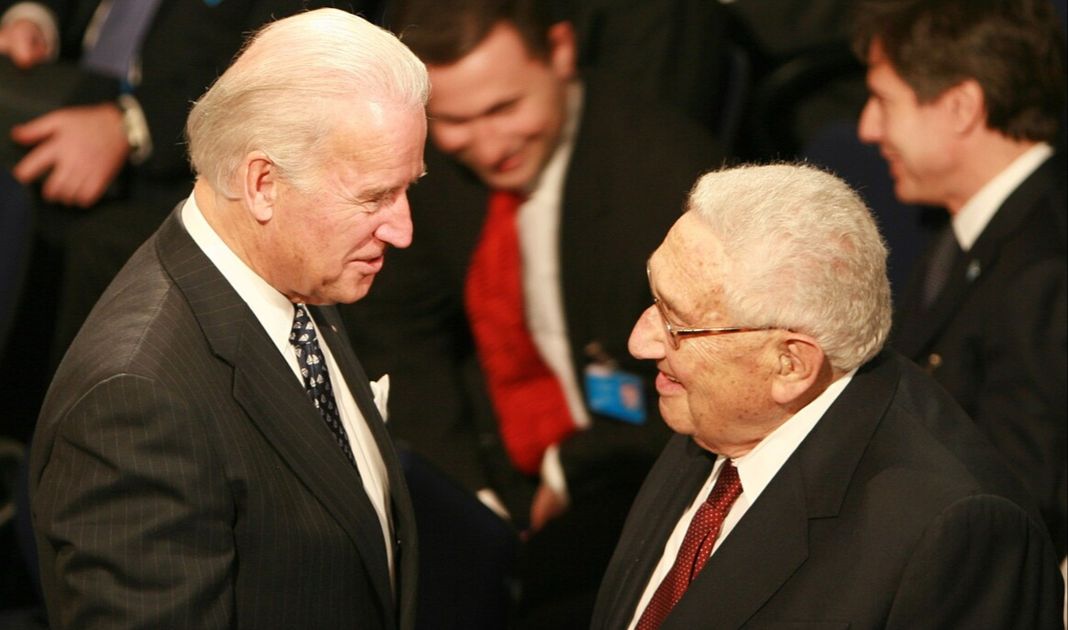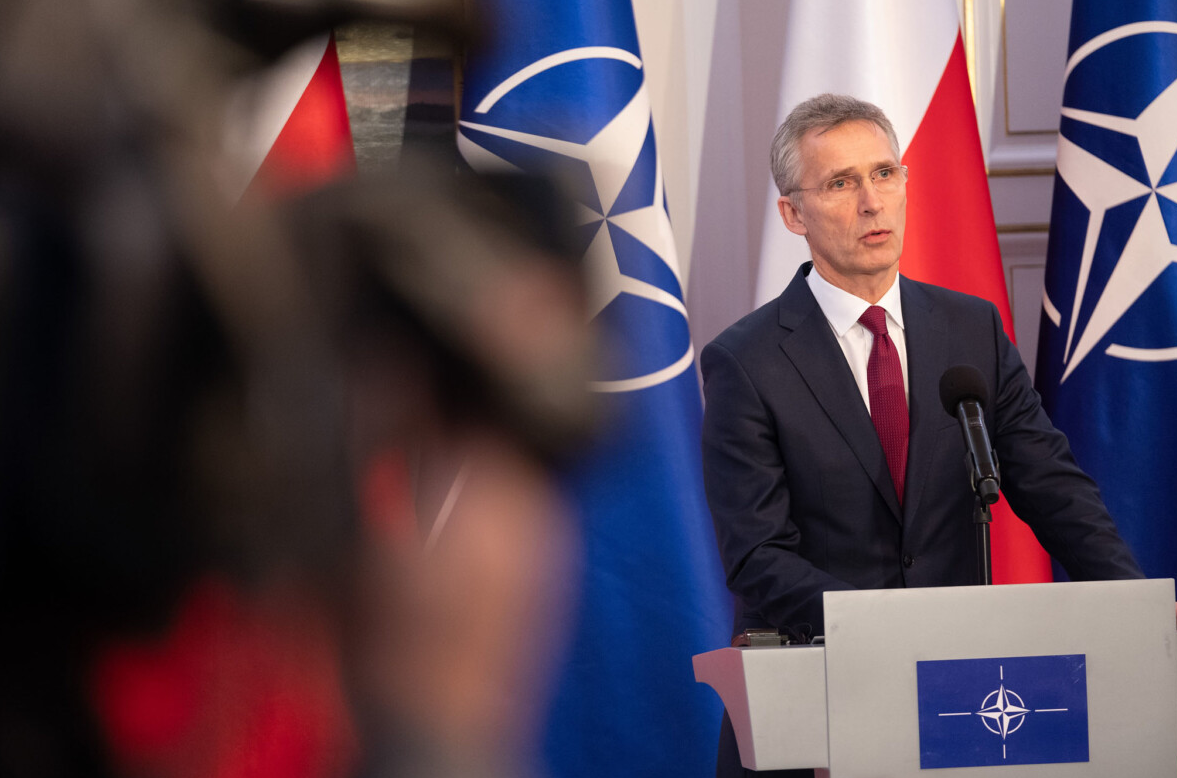Making realism real – using competing theories in analysis and strategy

(Fot. Wikimedia Commons)
This is namely the common points, linking realism on one hand with liberalism and constructivism on the other. Since readers are mostly realists, I don’t feel the necessity to outline the advantages of that school – instead, this essay aims to provoke reflections about considering its competition in strategic calculations. And to prove how the seemingly idealistic concepts of liberals and constructivists may actually align with the realist perspective.
Alliance of common values and strategic predictability – sources of American dominance
America’s hegemonic position and American geostrategy as a whole are an excellent case for why direct national interests and balance of power aren’t enough to explain international politics. The United Statesmaintains its dominance through a broad alliance system, based upon countries which accept American leadership in exchange for its stabilising role and security guarantees. Despite being the greatest, Washington has probably never had sufficient power to fully force its will onto the West, let alone the entire world. Since 1914, America’s hard power has usually been backed up by a sense of common values with allies, who accepted it gaining clout. Had other countries calculated only in terms of raw power and thus felt more sceptical or even threatened by US influence, they’d have undertaken many more steps to lower the dependence. In that case, America would still be number 1, but more as a regional power with big clout globally, not as the hegemon capable of creating and guarding rules for the entire planet. That’s precisely the reason why China, though it may one day become the world’s strongest country, is unlikely to ever set up its own global order, like the US.
The American leadership and alliances system implies that Washington can’t act in the balance of power paradigm. That’s because its power projection, the dominance of the dollar and other layers of its global position rely heavily on credibility. The US is expected, and often bound by law, to intervene in the defence of its allies, as well as assure them of their security in times of peace. It cannot simply refuse to provide military help to its partners, even if the direct calculation of national interest and balance of power paradigm suggest otherwise. That way America would lose credibility as a security guarantor not only for the country it had failed to defend, but amongst all allies towards which it had a similar level of obligation. Perhaps those who have common direct geostrategic interests with the US, like Japan, would remain calm, however more indirect allies, relying heavily on the general position of Washington or formal guarantees, like Israel or NATO partners, would turn away. Why wouldn’t they go their own path, if from now on only a direct link of strategic interest makes deterrence believable? Such a dismantling of the alliance system would be detrimental to the US global position and would likely turn its status back into a regional power. Moreover, even the few countries with actual direct importance for the US, like Japan or Australia may feel the need to reduce their dependence and develop nuclear weapons, because strategic goals don’t have to be common forever. Japan might not be interested in risking war with a giant and its largest trade partner in defence of Taiwan, and Australia will have to be assured of long-term deterrence vis-a-vis the rising power of Indonesia, which, contrary to China, doesn’t pose a major threat to the US. Direct egoism can destroy long-term interest.
In game theory there’s a distinction between games that are played once, and games that are repeated over and over. Supposing any case of American foreign policy would be a single game, then a sudden and exotic change of alliances, like turning Russia against China in exchange for Eastern European dominance, seems like a good tactical idea. If, however, we assume geopolitics is an ongoing sum of games, then we are going to be assessed by our enemies and potential partners through the lenses of past performance. This shapes credibility which determines ability to effectively deter or cooperate. If our enemies see that we always react to a certain hostile behaviour, they’ll be less vociferous than if we reacted only occasionally. If our allies in need see that we support them every single time and no one is left behind, they’ll be more willing to accept our leadership, than if we could deny help because of short-term interest. This way, we use predictability to reinforce our position. The US, acting by the values pattern is able to assure and maintain more committed allies than through acting by the balance-of-power pattern. That is, by the way, a similar mechanism to the one pointed out in Crowe’s Memorandum – where the author argued that to keep its position and thus protect its long-term interests, maritime power should respect certain rules (in that case – freedom of strategic flows), even if it means resigning from certain tactical moves.
If we take credibility into consideration, it turns out that formal agreements, policy statements and even (to a lesser extent) verbal declarations actually do matter. Also, from a realist point of view, with hard power factors like access to allies’ military bases and world financial dominance being at stake. True realism requires acknowledgment of key long-term processes and making use of them, even if that collides with short-term, direct interests.
(Fot. flickr.com)
It needs to be stressed however, that the axiological aspect of American geostrategy, despite being of vital importance, exists because of real power supporting it. Having acknowledged the role of liberal factors, one should not fall for idealist wishful thinking and believe that mere values and words would replace wealth and tanks, because the latter are the necessary tools to guard the former. The essence of US grand strategy is a well-balanced combination of both power and principle, with one supporting the other and vice-versa.
When non-realists come to power
Let’s take a look at another thing which realists need to acknowledge in order to get a more comprehensive view of international affairs. However effective realism may be in assessing the balance of power, there are people who simply refuse to share that viewpoint. This wouldn’t be an issue if those who sincerely believed in idealism, liberalism, or constructivism in global politics weren’t so prevalent amongst government advisors, military strategists and politicians themselves. And what realists see and are annoyed by so much in the public debate, is the factor they tend to ignore so often in their analyses – the mere existence of unlike-minded decision-makers obliges us to take those theories into consideration (however irrational one might think they are).
It would be a huge and potentially dangerous mistake for a country’s leader to assume that other heads of state perceive geopolitics in the same manner they do, as this could lead to detrimental miscalculations. After WWII, being sure that Western politicians thought like he did, Stalin grew in concern about American military posture in Europe and pro-democratic calls with regard to its Eastern part. In reality, however, Western countries did not see the USSR as a threat nor a target right after the war. Without realising that, Stalin began to act in an aggressive manner, uniting the West against a common enemy, thus worsening the Soviet position. Realpolitik doesn’t work that well if applied in its raw form vis-a-vis an unlike-minded partner or competitor.
Moreover, supposing some of our allies or enemies were non-realists, it would be naïve to try to achieve our goals only with the use of hard power. If we embrace a partnership with the values-oriented or even ideologically driven leadership of another country, we may need to reassure it axiologically – and perhaps not only parallelly to purely strategic moves, but sometimes even contrary to what would normally be seen as smart, realist behaviour. That for instance could include symbolism, which isn’t a direct, measurable reinforcement, but rather a soft use of our partner’s ideals to strengthen the relationship. This is often done, by the way, with regard to Polish elites – their beliefs, mental models, wishful thinking and ego are satisfied by allies, who use idealist rhetoric instead of real power, or even the pretence thereof. If we assume that governments other than Polish ones may also be prone to non-realist factors, then it’s absolutely necessary to include those in our predictions, strategies and policies towards such countries and their leaders.
World order transition and perception of reality
Miscalculations of other parties’ perceptions are even more likely to occur in unstable times of shifts in the international order. In such periods, the fog of arising challenges means that new perspectives compete with the old ones, as elements of the declining order mix with fresh reality. Some people are mentally still in the past era and some reject it quickly, while others try to find a new grip in face of uncertainty. If the declining order is based on a specific set of ideas, old mental models might lead some decision-makers into the same habitual actions, even as others look for more up-to-date solutions. That way, idealist, liberal and constructivist perspectives can still make their way through even during an era of power politics.
Such phenomena could be seen after World War I, when Wilsonian America shaped European affairs and even influenced Britain to follow its idealist path, while France was still deeply grounded in her raison d’Etat traditions. The attitude of the Anglo-Saxons paved their way to appeasing Hitler and focusing more on the intentions of consecutive German leaderships, rather than the balance of power, which was shifting more and more towards Berlin. One can argue that Wilson’s era was just another rhetorical cover-up for realpolitik. However, such claims don’t explain Washington and London totally ignoring the Third Reich rising to a position from which it could threaten the European security architecture. But what the realist-minded British leaders of the 19th Century would have addressed quickly, the idealist elites of the 20th Century failed to even recognise on time. That’s a strong case against idealism in foreign policy without having power or a proper situation assessment to back it up first. At the same time, it also proves that a non-realist mentality may play a key role in the behaviour of states, especially as remains of status quo ante and therefore has to be considered in one’s calculations.
As another example, American geostrategy, due to the pause of the 1990s and 2000s, was able to become driven more by axiology and less by pure strategy than during past periods. For that matter, world leaders had to act accordingly, sometimes even frankly believing in promoted ideals. And even as currently the world order goes back to hard power factors, many of them still assess it with a liberal mindset, or at least with a consideration thereof.
The battle for new geopolitical order is also a battle of perspectives – especially if the past one consisted of liberal elements, such as international law and institutions or collective security alliances. Those structures could have been designed in a liberal manner but survive long enough to see themselves become actors (or objects) in times of power politics. And, once again, the mere existence of those who fail to see the changing reality, or simply see it differently, itself shapes the geopolitics. The trilateral alliance of Prussia, Austria and Russia after the Congress of Vienna, is also a great example of such a dynamic. It was set on common values, influencing each party’s interpretation of their national interests. But as the situation kept evolving and driving a wedge between allies, it gradually lost its hard, structural basis. Seeing that, the Austrian leadership decided to break it under a proper occasion – so that Austria could at least enter the new strategic reality from a better position. Choosing that path and exercising it during the Crimean War eventually resulted in return of power politics to relations between the three states and plunging Austria in a crush zone, the exact situation the mentioned agreement was meant to avoid. Austrian leadership had likely fallen for a misconception of fake dichotomy between rule-based order and a power-based one, failing to acknowledge the ongoing mixing of both, at least during transition periods.
Similar patterns might be seen today, as Pax Americana slowly diminishes into a multipolar world, but its institutional legacy is still there. A precise example would be NATO, which lost its purely strategic sense for many member states with the collapse of the USSR, but has maintained a certain degree of cohesion, still contributing to the alliance’s effectiveness. Although for America the case is more about credibility, for Western and Southern Europeans deploying forces on the Eastern flank, sending arms to Ukraine, and agreeing or even vowing tough sanctions against Russia (often harming their own private sector) can’t be explained purely by traditionally-understood strategic goals. And such basic cohesion, although not justified by national interests, shapes the security architecture, constituting effective European deterrence, even if depending strongly on strategic ambiguity.
That’s also kind of a self-fulfilling prophecy – the existence of liberal structures makes even realist-minded leaders follow them. This could be seen with regard to France, which had often criticised NATO and focused more on bilateral agreements and the EU defence system, with France playing a leading French role. Since the Russo-Ukrainian war began, it has once again started to see itself primarily as a NATO power. This puts France, its ambitions and military force back in a transatlantic framework, which has profound consequences for the future of Paris and Europe. It would have gone a different way, had the alliance limited itself to a hub and spoke setting – which would have been a better reflection of reality. Now, paradoxically, the outdated shape of NATO has helped re-consolidate the transatlantic community, as a result of the “electroshock” it received by the war in Ukraine, to quote president Macron himself.
That’s why we can’t see the current geopolitical situation as a “post-alliance system”. We are in the transition period, where the old mixes with the new, and seemingly outdated structures still play a role.
(Fot. pxhere.com)
Beliefs of elites and societies
Soft elements like values, narration or a general zeitgeist may directly influence the beliefs of world leaders, also within the realist point of view. Realism in international affairs puts the emphasis on pragmatic action and advocates for a Machiavellian attitude. It should be noted, however, that pure pragmatism doesn’t exist, as it always has a final goal to serve – and it’s safe to assume that people have different concepts of the ultimate mission, apart from general ambitions, like strengthening one’s country. Therefore, heads of state can be cold-blooded, rational actors, and yet still perceive the world differently, due to a dissimilar concept of what their pragmatic actions are supposed to achieve at the end of the road.
The understanding of means to and end may vary depending for instance on political culture, shaping every calculation. Let’s take Russian and Western attitudes towards the relation between the economy and the military. The West treats living standards as a final goal and national security as a protection thereof, whereas for Russia, power of the state, mainly through a strong army, is an end supported by economic means. One can’t analyse the foreign policy of Moscow or Paris without considering such mental differences. They heavily influence leaders’ mental maps, thus determining their perception of reality and strategic calculations, even within the realist paradigm.
Promotion of certain values may also influence politics indirectly, namely through public opinion. Firstly, through changing the mentality of a society, one can change the default mindset its future leaders will assess the world with – just like American culture, deeply rooted in our everyday life, has led many to believe that the US is an unbeatable, eternal superpower. Movie scenes with fighters flying over a carrier as the sun sets and the wealth seen at every square metre of New York – if these are our first connotations with America, it’s way harder to assess its power and possibilities objectively. Secondly, the masses can exert pressure on decision-makers and businesspeople to go down paths they otherwise wouldn’t. The huge exodus of companies from Russia is partly due to sanctions, but social pressure to withdraw has also played a role. Firms that failed to do so have so far experienced falls in revenue owing to consumer boycotts. At the same time, many business leaders have dedicated their resources to helping the Ukrainian people and humanitarian initiatives in neighbouring countries, thus lowering the burden on their governments and societies.
Suspending the balance of power
For the reasons mentioned, building and maintaining a community of shared values and purposes can not only shape, but even to a certain extent suspend power politics between its members. Take the Vienna Congress as an example. Beside setting a well-balanced power order on the old continent, it also restored a common values system. As Kissinger lays out in Diplomacy, while the first one lowered the chance of successfully dismantling the European status quo by any state, the second lowered the will – the mere human will – to do so. The trilateral alliance between Austria, Prussia, and Russia in the first half of the 20th century also suspended power politics amongst the three. Because all members pursued a common goal, namely countering revolution and preserving conservative values, Vienna was able to sustain its position on the continent for much longer than raw power would suggest, despite having two stronger countries as neighbours.
Look at the contemporary West for instance – neither the societies nor the leaders imagine going on a war against other countries belonging to the same community. The Western sense of basic unity not only applies to such an extreme example, but also to solidarity in face of a fundamental threat to common values, which can be seen with regard to the Russo-Ukrainian war and the massive aid Kyiv receives. Weaponry and humanitarian aid are sent also from states that have no strategic interests in Ukraine, such as Spain or Australia. Sanctions on Russia have been imposed by Japan and even thus-far neutral Switzerland. These actions can’t be explained by raw balance of power. The war in Ukraine at large, with its profound political, economic, and social consequences for Russia, should finally put an end to the notion of values being a non-factor in international politics.
It is true that the current crisis has also shown gaps in Western unity – German passivity and the pro-Russian attitude of Hungary can’t be ignored and the appropriate conclusions need to be made. That however debunks only the utopian vision of full unity, not the concept of Western coherence in general. One should ask oneself whether such behaviours would be less, or maybe more frequent if the baseline values of the West ceased to exist. The obvious answer implies that although common values don’t cancel national interests, they put them in a favourable framework – favourable especially for weaker or exposed countries.
As proved above, axiology plays a role by shaping the will of elites and societies. The other side of the same coin is that values can be used purely pragmatically to support a preferable set of international affairs. That is to say – also if all parties involved aren’t sincerely guided by them.
Peace and the condemnation of military aggression as a common value is a perfect case. Countries violating such an idea are prone to sanctions and isolation by those who respect it. And let me give you the essence of how realism and constructivism may complement each other – many leaders aren’t married to such a belief deep down in their hearts, but will still advocate in favour thereof, because it’s in their (realistically understood) interest. It has the effect of stabilising world politics and makes the use of force against their country less likely. Therefore, Taiwanese government officials might be personally unbothered by Russian aggression against Ukraine, but will join western countries in condemnation and sanctions because the same value-based mechanisms raise potential costs (thus lowering the probability) of a Chinese invasion of Taiwan.
One may find other examples with regard to non-proliferation, the nuclear taboo, human rights and other liberal standards which can serve as a tool to maintain a favourable framework of international relations. The agreements (formal or informal) based on such values are similar in nature to American alliance credibility or the Crowe memorandum. They are intangible concepts but their potential violation would profoundly change reality. They require short-term self-restraint, but are of great benefit in the long run. Finally, despite the axiological frame, they serve as a tool which might (or should) be supported also by cold-hearted realists – because this is not about gratitude, but a maintenance of suitable tendencies.
Such agreements work based on a rule of mutuality – one respects them by committing to or refraining from certain behaviours, not necessarily because it’s in their current interest, but in order to make others follow the same path in the future. We should make a rational assumption, that if we behave in a certain way towards others, they can mirror our behaviour. From a general point of view, free trade is such an example – we could impose import barriers meant to increase our benefits, but then others would do the same with regard to us. We may use hard power to compel our neighbours to follow our will, but then we can’t expect them to support us, should we find ourselves in similar trouble.
The question isn’t, “Do we want to live in a world where others obey the rules and we break them?” The question is rather, “Are we able to prevail in a world where no one cares about the rules?” – rules which, in the mentioned examples, would mean a world with severe trade frictions and traditional military threats. And if we’re not able, well – maybe it’s in our deepest concern not to undermine them in the first place.
The mistake of taking such a narrow perspective has been committed, in my humble and inexperienced opinion, by eminent Strategy&Future expert Marek Budzisz. In his article for Onet, Mr. Budzisz argues that the defence of the Baltic states by Poland should be conditional, namely based on their support for the Polish government in its spats with the European Commission. What the author fails to recognise here is that although NATO is based on hard power in its means, it currently serves liberal ideas as the end – by extending pure realism onto its final goal, we unravel the liberal foundation uniting the alliance. And it’s also us, not only the Baltics who would be affected by such short-sightedness. If pure realism is now the end goal of NATO, or at least if we frame it that way, then article 5 is dead in the water. Germany, for instance, might condition their help by demanding support for their energetic strategy in the EU, while the French could simply refuse to do anything, arguing that it’s not their war. That way, Realpolitik turns against itself.
End-conclusions for Poland
It has to be noted that the liberal framework for international affairs suits predominantly smaller and weaker countries because it serves as a shield against hard-power pressure from stronger actors. When it gets dismantled and we’re back to power politics, once again the strong do what they can and the weak do what they must. Assuming that Poland is a small country with medium-size potential that lies between two significantly bigger powers, it should go out of its way in making sure that the balance of power paradigm stays at least to some extent limited by liberalism. Through suspending power politics, value-based order helps Poland achieve two main goals of foreign policy – economic development and security.
The founder of Polish nationalism, Roman Dmowski, wrote in his opus magnum “Thoughts of a Modern Pole” that patriotism and societal unity obviously work in favour of achieving national goals, so even if he didn’t truly feel like chanting patriotic slogans, he’d still do it for rational reasons. To paraphrase his philosophy, even if a Polish politician or strategist views the world in a cold, realist manner, they should still pragmatically support the liberal set of rules, as its continuity serves our Machiavellian goals.
By combining that with an acknowledgment of the role played by non-realist aspects of geopolitics, one will get a clearer perspective of international affairs, allowing for a higher-complexity analysis and better-suited policy conclusions. Failing to do so, however tempting, would mean paying tribute to a theoretical dogma, which is exactly what we as analysts and strategists would like to avoid. Let’s be realists, therefore, let’s perceive the world as it really is and be pragmatic – even if that means considering liberal or constructivist theories in our analysis, and using them smartly for our own, national good.
Autor
Maksymilian Skrzypczak
Maksymilian Skrzypczak studies International Economic Relations at the University of Economics in Poznań. He took 57th position in Poland, and at the same time among the top 1% of participants of the prestigious OWE Economic Olympics. He works as a copywriter and English tutor. Formerly a young speaker and activist, currently one of the leaders of the social project “Postaw na Przedsiębiorczość”. He is interested in geopolitics, entrepreneurship and improving the body, mind and soul.








Trwa ładowanie...